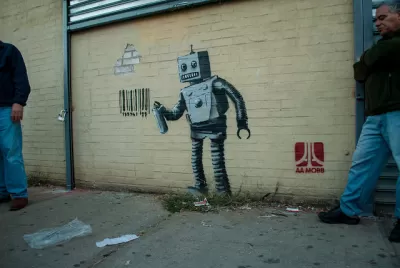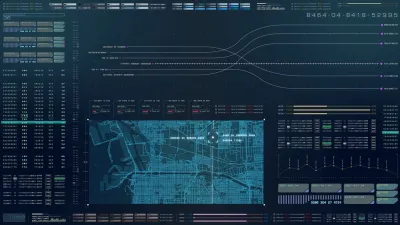Three case studies of robotics technology integrated into the design and management of urban settings offers a glimpse of a potential future.

Mateja Kovacic writes to describe a "fourth industrial revolution"—i.e., the spread or robots throughout urban areas. "This fourth industrial revolution driven by robots is shaping urban spaces and urban life in response to opportunities and challenges in economic, social, political and healthcare domains," writes Kovacic. "Our cities are becoming too big for humans to manage."
According to Kovacic, cities are starting to look to robotic solutions to some of the most pressing issues in cities: "Whether through autonomous cars, automated pharmacists, service robots in local stores, or autonomous drones delivering Amazon parcels, cities are being automated at a steady pace."
As case studies, Kovacic examines three case studies from around the world:
- Tokyo, where the Robot Revolution Realisation Council was established in 2014, with the stated goals of economic reinvigoration, cultural branding, and international demonstration. The 2020 Olympics will feature high-profile demonstrations of robotic technology.
- Singapore, where the government is "experimenting with robots with a different objective: as physical extensions of existing systems to improve management and control of the city."
- Dubai, where smart city technology and robotics pursue the goal of creating the happiest city on earth.
FULL STORY: Robot Cities: Three Urban Prototypes That Could Revolutionise Our Lives

Maui's Vacation Rental Debate Turns Ugly
Verbal attacks, misinformation campaigns and fistfights plague a high-stakes debate to convert thousands of vacation rentals into long-term housing.

Planetizen Federal Action Tracker
A weekly monitor of how Trump’s orders and actions are impacting planners and planning in America.

San Francisco Suspends Traffic Calming Amidst Record Deaths
Citing “a challenging fiscal landscape,” the city will cease the program on the heels of 42 traffic deaths, including 24 pedestrians.

Bend, Oregon Zoning Reforms Prioritize Small-Scale Housing
The city altered its zoning code to allow multi-family housing and eliminated parking mandates citywide.

Amtrak Cutting Jobs, Funding to High-Speed Rail
The agency plans to cut 10 percent of its workforce and has confirmed it will not fund new high-speed rail projects.

LA Denies Basic Services to Unhoused Residents
The city has repeatedly failed to respond to requests for trash pickup at encampment sites, and eliminated a program that provided mobile showers and toilets.
Urban Design for Planners 1: Software Tools
This six-course series explores essential urban design concepts using open source software and equips planners with the tools they need to participate fully in the urban design process.
Planning for Universal Design
Learn the tools for implementing Universal Design in planning regulations.
planning NEXT
Appalachian Highlands Housing Partners
Mpact (founded as Rail~Volution)
City of Camden Redevelopment Agency
City of Astoria
City of Portland
City of Laramie





























